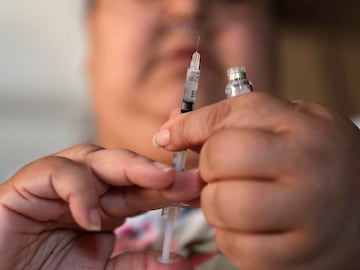Source :NEWS18 NEWS
Last Updated:January 15, 2025, 18:05 IST
Like Type 1 diabetes, in patients suffering from Type 1.5, the immune system attacks the pancreas. However, it develops more slowly, similar to Type 2. Treatment for Type 1.5 may also differ from Type 1.
Like individuals with Type 1 diabetes, patients with this condition may require insulin therapy. (Representative/Shutterstock)
Most people have heard of Type 1 and Type 2 diabetes, but far fewer are familiar with Type 1.5 diabetes, despite its potentially serious effects.
Difficult to detect, Type 1.5 diabetes often remains undiagnosed, silently impacting the body. Many individuals with this condition are unaware they have it, highlighting the need for greater awareness and understanding.
related stories
Speaking to News18, Dr. Anil Bansal, former President and Senior Physician of Delhi Medical Association, said, “Type 1.5 diabetes is a condition which is a combination of Type 1 and Type 2 diabetes. In medical language, it is called Latent Autoimmune Diabetes in Adults (LADA). This type of diabetes affects adults.”
When people have Type 1.5 diabetes, their immune system starts damaging their pancreas, which reduces insulin production. This disease shares similarities with both Type 1 and Type 2 diabetes.
Like Type 1 diabetes, the immune system attacks the pancreas. However, Type 1.5 diabetes develops slowly, resembling the progression of Type 2 diabetes. Furthermore, the treatment for Type 1.5 diabetes can differ from that of Type 1 diabetes.
Dr Bansal stated that “Type 1.5 diabetes is an autoimmune disease in which the body’s immune system attacks its own beta cells, which produce insulin. This process happens gradually, so insulin production decreases initially and the person usually shows symptoms like type 2 diabetes. However, over time the pancreas reduces insulin production significantly, and then this condition becomes like type 1 diabetes.” Genetic and environmental factors can also be causes of this disease.
According to health experts, the symptoms of Type 1.5 diabetes are similar to those of Type 2 diabetes in the initial stages. These symptoms include excessive thirst, frequent urination, fatigue, blurred vision and weight changes. As the disease progresses, individuals may experience physical weakness and other serious symptoms due to reduced insulin production. This reduction leads to a dangerous build-up of acid in the body. If left untreated, this condition can contribute to heart disease, kidney problems and vision loss.
According to doctors, the treatment for Type 1.5 diabetes combines aspects of both Type 1 and Type 2 diabetes management. Treatment requires medication, insulin dosage adjustments, and lifestyle modifications. Like individuals with Type 1 diabetes, patients with this condition may require insulin therapy. If blood sugar levels are initially controlled, medications used to treat Type 2 diabetes can also be incorporated. Additionally, a balanced diet and regular physical activity are essential for managing this disease effectively.
SOURCE : NEWS 18







